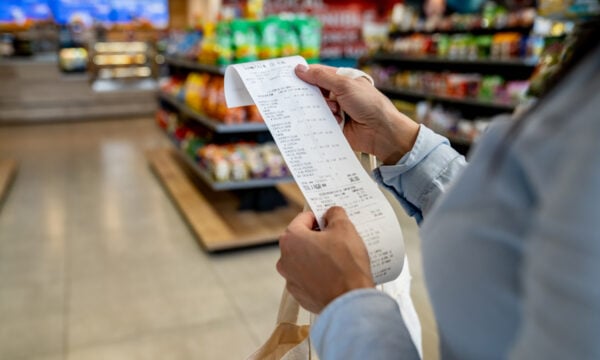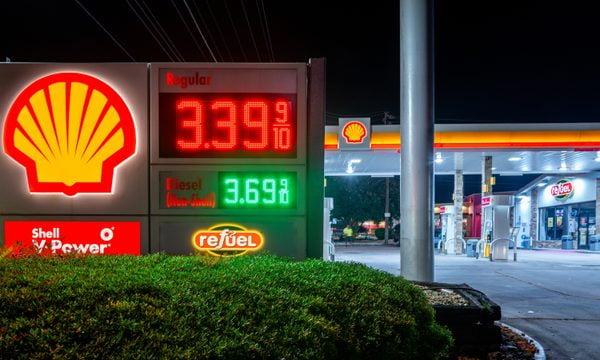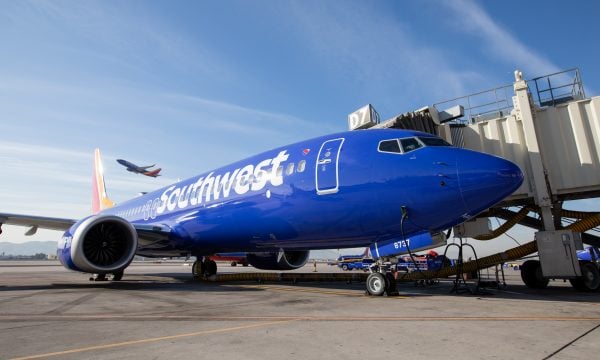Winter Storms Slow Crude Production, Gas Prices Still Low
The national average for a gallon of regular ticked down to $2.875 as of Feb. 2.

Many, or all, of the products featured on this page are from our advertising partners who compensate us when you take certain actions on our website or click to take an action on their website. However, this does not influence our evaluations. Our opinions are our own. Here is a list of our partners and here's how we make money.
Updated on Feb. 2.
- The average regular gas price in the U.S. as of Feb. 2 is $2.875 per gallon, according to AAA, down from $3.098 a year ago and up from $2.830 last month.
As of Feb. 2, gas prices went down slightly since last week, according to AAA, which tracks fuel costs. Gas prices are below $3 in 43 states.
Recent winter storms throughout the U.S. disrupted supply as snowy conditions and severe cold slowed crude production and refinery operations, says AAA.
Prices typically go down in fall and winter. In October 2025, the national average began inching toward $3 per gallon for the first time in years, according to AAA. Prices stayed steady through Thanksgiving then began dipping below $3 at the start of December where they’ve since remained into the new year. The autumn and winter price drops are largely due to a decline in crude oil prices. Refiners also transitioned to a winter blend, which is cheaper and so supply costs have fallen.
The U.S. Energy Information Administration says the falling price of crude oil — accounting for half of retail gas prices — lowered prices at the pump in 2025. On a monthly average basis, the price of Brent crude oil dropped from $79 per barrel in January 2025 to $63 per barrel in December 2025 — its lowest average monthly price since the start of 2021, according to the EIA.
» Stay informed: Check out NerdWallet's news hub for all the latest.
Are oil prices going up?
Pump prices were stable this summer, especially compared to recent years, thanks to oil prices that had moderated at around $65 a barrel after spiking briefly in June in response to the Israel-Iran conflict.
Meet MoneyNerd, your weekly news decoder
So much news. So little time. NerdWallet's new weekly newsletter makes sense of the headlines that affect your wallet.
Gas price inflation, explained
It wasn’t that long ago that gas prices were soaring: Prices surged in 2021 and 2022, largely due to two economic disruptions: pandemic-related supply shocks and then Russia’s invasion of Ukraine. The combination of the two hit energy markets hard and prices never recovered to pre-pandemic levels.
Here’s what happened:
- In 2019, before the pandemic, the average per-gallon price of regular gas was $2.601, according to EIA data.
- Following Russia’s invasion of Ukraine, the national average increased before peaking at $5.016 per gallon on June 14, 2022, according to AAA.
- Since then, gas prices have retreated, but they haven’t returned to pre-pandemic levels. Today, gas prices are about 21% higher than they were six years ago.
Why gas prices remain higher than they used to be
At this time of year, seasonal factors play a considerable role in raising gas prices. A scheduled switch to summer-blend gasoline temporarily elevates prices through the warm months. Inflation, supply-chain disruptions and gas tax hikes can factor into higher prices, as well. But in the end, elevated oil prices are the main culprit.
The cost of oil typically represents more than half of the cost of a gallon of gasoline, according to the U.S. Energy Information Administration (EIA). So, a major reason gas prices have remained so high is that, until recently, oil prices were higher than they were before the pandemic hit in 2020 and Russia invaded Ukraine in 2022. That’s based on the average monthly price of West Texas Intermediate crude, which is used as the benchmark for oil prices in North America.
Keep in mind that gas prices at the pump rarely reflect that day’s market conditions. Instead, they represent costs incurred weeks, even months before. That lag makes prices slower to rise and fall than news headlines might suggest. And while spot shortages, refinery production shortages or blending issues can drive up gas prices locally, big nationwide swings in gas prices are almost always due to the price of crude oil.
So far in 2026, fuel costs are much lower than they were a year ago. Here’s how gas prices compare today:
- As of Feb. 2, the average regular gas price in the U.S. is $2.875 per gallon, according to AAA, which tracks gas prices.
- The price is down from $2.881 per gallon a week ago.
- The price is up from $2.830 per gallon a month ago.
- A year ago, the price was $3.098 per gallon.
At the moment, price fluctuations are short-term trends happening within the larger picture of elevated gas prices. Oil prices, though still higher than they were before the pandemic, are well below their June 2022 peak of almost $120 per barrel.
Average gas price per state
The average gas price per state varies widely, with the most expensive state typically costing about $2 more per gallon of regular than the least expensive state.
Article sources
NerdWallet writers are subject matter authorities who use primary,
trustworthy sources to inform their work, including peer-reviewed
studies, government websites, academic research and interviews with
industry experts. All content is fact-checked for accuracy, timeliness
and relevance. You can learn more about NerdWallet's high
standards for journalism by reading our
editorial guidelines.
Related articles

















